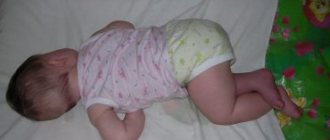Home › Child under one year old › Diseases
Author of the article
Ekaterina Rakitina Doctor Dietrich Bonhoeffer Klinikum, Germany
Reading time: 4 minutes
AA
Article last updated: 05/06/2019
Most parents want their children to get plenty of sleep. During sleep, the baby gains strength, and the mother can do household chores. But most often, babies do not meet the expectations of young parents, sleep little, require a lot of attention and do not leave time for housekeeping. However, there are opposite situations when the child sleeps too long. If he is calm, active while awake and eats well, then this fact may not cause concern. But what if the child sleeps a lot during illness? Should I wake him up or let him sleep? How long should a baby sleep? All these questions can be answered below.
How long does a baby sleep under one year?
A newborn baby sleeps almost all the time. He opens his eyes to eat, to report that his diaper is full. Then he falls asleep again. So, children up to a month rest about 20 hours a day.
Gradually the regime begins to change. The baby becomes more interested in what is happening around him, carefully examines the surrounding objects, and studies people. The period of wakefulness increases:
- By one month of age, babies sleep for approximately 18 hours. Typically 10 of them are spent at night. Babies do not yet distinguish between morning and evening and rush to close their eyes when they get tired. Therefore, parents must get involved here in order to form the correct regime for the baby;
- At 3 months, babies rest from 14 to 17 hours. Sleeping at night takes longer;
- By six months, the activity of infants increases. Some children are already sitting and crawling, they are involved in communication with adults, they are attracted and interested in everything. At night, babies sleep on average 11 hours, during the day - 3-4;
- At 9 months, rest time decreases again. At the same time, the number of daytime dreams decreases. At night, babies continue to rest for 10-12 hours, a total of 13-16 per day;
- By the age of one year, some children switch to one nap during the day. But it becomes longer, takes about 2-3 hours. Night rest remains the same.
The data given is average. You can rely on them to understand whether the baby’s routine has been optimally established. You need to trust your own child, observing his well-being.
Healthy and active baby
If the baby sleeps peacefully, without frequent awakenings, and goes to bed and gets up at approximately the same time, and is active and cheerful during the day, has a good appetite and gains weight, then everything is in order. In this case, there is no need to worry, even if his sleep does not coincide with age norms.
A child sleeps a lot when he is sick and after a fever: sleep norms, reasons, what to do
New parents know that newborns sleep a lot. They need proper rest in order to grow and develop. With age, needs change and periods of activity increase.
Many people begin to worry if a child sleeps a lot when he is sick, not understanding why this happens. After all, before this the baby rested much less. Most often, this does not hide dangerous symptoms.
In order not to cause complications and help the baby feel comfortable, you need to take care of the quality of his sleep, not forgetting about the drinking regime and treatment.
The baby is sleeping
How long does a baby sleep under one year?
A newborn baby sleeps almost all the time. He opens his eyes to eat, to report that his diaper is full. Then he falls asleep again. So, children up to a month rest about 20 hours a day.
Gradually the regime begins to change. The baby becomes more interested in what is happening around him, carefully examines the surrounding objects, and studies people. The period of wakefulness increases:
- By one month of age, babies sleep for approximately 18 hours. Typically 10 of them are spent at night. Babies do not yet distinguish between morning and evening and rush to close their eyes when they get tired. Therefore, parents must get involved here in order to form the correct regime for the baby;
- At 3 months, babies rest from 14 to 17 hours. Sleeping at night takes longer;
- By six months, the activity of infants increases. Some children are already sitting and crawling, they are involved in communication with adults, they are attracted and interested in everything. At night, babies sleep on average 11 hours, during the day - 3-4;
- At 9 months, rest time decreases again. At the same time, the number of daytime dreams decreases. At night, babies continue to rest for 10-12 hours, a total of 13-16 per day;
- By the age of one year, some children switch to one nap during the day. But it becomes longer, takes about 2-3 hours. Night rest remains the same.
The data given is average. You can rely on them to understand whether the baby’s routine has been optimally established. You need to trust your own child, observing his well-being.
Healthy and active baby
If the baby sleeps peacefully, without frequent awakenings, and goes to bed and gets up at approximately the same time, and is active and cheerful during the day, has a good appetite and gains weight, then everything is in order. In this case, there is no need to worry, even if his sleep does not coincide with age norms.
Why does a child sleep a lot when sick?
Usually, if a child is sick and constantly sleeps, there is no need to worry about this. After all, all the body’s forces are aimed at fighting infection.
Newborn sleeps a lot and does not ask to eat - reasons
Drowsiness increases if the baby's body temperature rises. But this does not mean that the baby does not need to be woken up and fed. Lost energy and strength must be replenished in order to bring the moment of recovery closer.
If the baby is breastfed, this is much easier to do. It is enough to put the baby to the breast, and he will wake up, feeling a familiar and native smell.
Note! In addition, mother’s milk consists of 80 percent water, which means that thanks to it, you can also improve your drinking regime.
With bottle-fed children it is somewhat more difficult. But you definitely need to feed them. It is necessary to offer the child smaller portions, but more often, observing the proportions when preparing. If the baby is already eating complementary foods, then you should not give him new foods during the period of illness.
You can offer vegetables and cereals, the main thing is not to do it forcibly. Let the baby’s strength be better spent fighting the disease than digesting a portion of food. His appetite will return gradually as he recovers.
The main thing is to continue to offer your baby food.
Poor appetite when sick
Important! If a child doesn't eat, he won't get the nutrients he needs. This means that he will become even more weakened, which will only increase drowsiness.
There are alarming symptoms that require you to call an ambulance:
- The child does not wake up for 5 hours in a row, and it is impossible to wake him up;
- Parents cannot feed the baby on their own;
- Signs of dehydration have appeared, the baby has not written for a long time, his fontanel has sunk in, he is crying without tears;
- The skin takes on a bluish tint;
- Breathing becomes harsh and shallow;
- The temperature rises and does not go down.
If there are no such signs, the child eats in small portions and drinks, then it is necessary to adhere to the prescribed treatment at home. The main thing is to provide the baby with comfort. It is a favorable environment at home, optimal temperature and humidity that will help you recover faster.
During the period of illness, the child’s routine changes, rest time increases, and activity decreases. Sleep is needed to restore strength, and the fact that it becomes prolonged is considered normal. As soon as the baby begins to return to his usual schedule, we can say that the fears are over and the child will soon be healthy.
Note! A baby can get sick at any age; in infants the disease develops rapidly, so parents should be aware of the symptoms that require immediate medical intervention.
The child sleeps a lot after illness
Why does a 3-week-old baby sleep little - reasons
If after the end of the illness, especially after fever, the child sleeps for a long time, this is not surprising. He was exhausted after fighting the infection.
In addition, when the temperature drops, great weakness is felt. The child is tempted to sleep, which is necessary to replenish energy. It will take time for the baby to return to his previous routine.
The baby sleeps constantly
Excessive sleepiness is not always without danger. Sometimes it is observed in the following cases:
- If you have an infection that is asymptomatic;
- During an exacerbation of chronic diseases, for example, problems with the thyroid gland;
- A bacteria has attached itself, or the child begins to get sick again, having picked up a new virus in a weakened body.
To exclude the development of pathological processes, treatment of an infant should be carried out under the supervision of a physician. Only he will be able to establish the true cause of the ailment, find out whether it is pathological in nature or represents the next stage of recovery. It’s good when a pediatric doctor can dynamically track changes in the baby’s condition.
Parents' actions
Parents should stay close to their sick baby, constantly monitoring his well-being. The smaller the child, the faster the infection spreads, so immediately after the appearance of unpleasant symptoms you should call a doctor.
Why does a child fart with poop - reasons
It is imperative to monitor the child’s temperature; when it rises, babies constantly sleep. If it reaches critical levels, be sure to wake up the baby to give an antipyretic. If the baby is sweating, then you need to change his clothes and replace the bed linen.
Parents should understand that drowsiness accompanies high body temperature and is also present with significant fluid loss.
To prevent dehydration and further weakening of the child, mothers and fathers are obliged to provide him with plenty of fluids. It's good if the child drinks water.
When he has already begun to be accustomed to adult food, you can give him compotes and fruit drinks without sugar. The main thing is to use only those products that the baby has already become familiar with.
Note! Drinks should be given to the child in small portions; the baby should drink at least a few sips every half hour. If he wants more, that’s even better; there’s no need to limit it.
Baby drinks water
It never hurts to take your temperature in the middle of the night. You can try to find out from the baby if anything hurts him. But you shouldn’t wake him up specifically for this. The temperature can also be monitored in a sleeping child.
How to improve your child's sleep quality
Children often have colds, accompanied by accumulation of mucus in the nasopharynx. In this case, you need to help the sick child so that he can sleep peacefully:
- Raise the head of the bed to an angle of no more than 30 degrees. Manipulations should be carried out specifically with the mattress, placing a cushion from a sheet or towel under it. There is no need to place the baby on a pillow or folded diaper;
- Carry out wet cleaning, washing floors, wiping dust daily;
- Ventilate the room before going to bed. Fresh air is essential for good sleep and quick recovery. Let your baby sleep in a cool place rather than in a stuffy room. You can always dress him warmer. When the room is hot, the mucus in the nose and throat dries out, which is dangerous for a bacterial infection. The situation is aggravated by the fact that the child does not move and drinks little. In this case, if complications arise, the use of antibiotics cannot be avoided.
Usually, if a child sleeps a lot when sick and after the alarming symptoms disappear, there is no need to worry. A weakened body needs rest to regain wasted strength and energy. This is typical not only for infants, but also for older children. The task of parents is to create optimal conditions so that the baby recovers faster and his condition does not worsen.
Source: https://kpoxa.info/zdorovie-pitanie/rebenok-mnogo-spit-bolezni.html
Why does a child sleep a lot when sick?
Usually, if a child is sick and constantly sleeps, there is no need to worry about this. After all, all the body’s forces are aimed at fighting infection.
Newborn sleeps a lot and does not ask to eat - reasons
Drowsiness increases if the baby's body temperature rises. But this does not mean that the baby does not need to be woken up and fed. Lost energy and strength must be replenished in order to bring the moment of recovery closer.
If the baby is breastfed, this is much easier to do. It is enough to put the baby to the breast, and he will wake up, feeling a familiar and native smell.
Note! In addition, mother’s milk consists of 80 percent water, which means that thanks to it, you can also improve your drinking regime.
With bottle-fed children it is somewhat more difficult. But you definitely need to feed them. It is necessary to offer the child smaller portions, but more often, observing the proportions when preparing. If the baby is already eating complementary foods, then you should not give him new foods during the period of illness. You can offer vegetables and cereals, the main thing is not to do it forcibly. Let the baby’s strength be better spent fighting the disease than digesting a portion of food. His appetite will return gradually as he recovers. The main thing is to continue to offer your baby food.
Poor appetite when sick
Important! If a child doesn't eat, he won't get the nutrients he needs. This means that he will become even more weakened, which will only increase drowsiness.
There are alarming symptoms that require you to call an ambulance:
- The child does not wake up for 5 hours in a row, and it is impossible to wake him up;
- Parents cannot feed the baby on their own;
- Signs of dehydration have appeared, the baby has not written for a long time, his fontanel has sunk in, he is crying without tears;
- The skin takes on a bluish tint;
- Breathing becomes harsh and shallow;
- The temperature rises and does not go down.
If there are no such signs, the child eats in small portions and drinks, then it is necessary to adhere to the prescribed treatment at home. The main thing is to provide the baby with comfort. It is a favorable environment at home, optimal temperature and humidity that will help you recover faster.
During the period of illness, the child’s routine changes, rest time increases, and activity decreases. Sleep is needed to restore strength, and the fact that it becomes prolonged is considered normal. As soon as the baby begins to return to his usual schedule, we can say that the fears are over and the child will soon be healthy.
Note! A baby can get sick at any age; in infants the disease develops rapidly, so parents should be aware of the symptoms that require immediate medical intervention.
Why does a child sleep a lot during illness?
Regardless of the child’s age, sleep is the main criterion for assessing his health. The presence of any obvious deviations in sleep patterns may indicate problems with well-being.
A child’s desire to fall asleep at an unusual time can be considered an alarming sign.
Parents should monitor the baby’s condition and measure general body temperature.
When a small body is fighting a disease, prolonged sleep is a normal physiological reaction. The baby’s body is still weak, so all his strength goes into coping with the disease. As a result, he gets tired and falls asleep, replenishing lost strength in his sleep.
During colds, many children have a fever, which is accompanied by drowsiness.
You can feed a child even if he doesn’t wake up on his own. The sleeping baby is simply applied to the breast. He should smell the milk and wake up or start eating, practically without opening his eyes. The main thing is that the baby drinks all the required portion of milk. If he falls asleep during feeding and stops sucking, you need to lightly rouse him.
If a child does not eat enough, this causes even greater weakness in the body, and therefore even greater drowsiness. At the same time, he does not receive enough of the substances necessary for full growth and development, and a mother without regular suction of milk from the breast may experience lactostasis (stagnation of milk in the ducts of the mammary glands).
Very often, a cold can be confused with teething. The signs preceding the appearance of the first baby teeth are similar to the symptoms of ARVI: fever, cough, runny nose, constipation or diarrhea, tearfulness and irritability. In any case, this period is no less difficult for the baby than a cold. Therefore, it is also often accompanied by drowsiness. A child can cry all night, and then, tired, sleep peacefully all day.
If a doctor examines the baby, diagnoses the disease and prescribes medications, but the parents cannot give them to the child, they will have to go to the hospital with the baby. Hospitalization is also necessary if the mother cannot feed the child on her own.
The child sleeps a lot after illness
Why does a 3-week-old baby sleep little - reasons
If after the end of the illness, especially after fever, the child sleeps for a long time, this is not surprising. He was exhausted after fighting the infection. In addition, when the temperature drops, great weakness is felt. The child is tempted to sleep, which is necessary to replenish energy. It will take time for the baby to return to his previous routine.
The baby sleeps constantly
Perhaps the baby does not have enough nutrients and nutrients, especially if he refused to eat when sick. As soon as the appetite returns to normal, the baby will begin to gain weight and become more active.
Excessive sleepiness is not always without danger. Sometimes it is observed in the following cases:
- If you have an infection that is asymptomatic;
- During an exacerbation of chronic diseases, for example, problems with the thyroid gland;
- A bacteria has attached itself, or the child begins to get sick again, having picked up a new virus in a weakened body.
To exclude the development of pathological processes, treatment of an infant should be carried out under the supervision of a physician. Only he will be able to establish the true cause of the ailment, find out whether it is pathological in nature or represents the next stage of recovery. It’s good when a pediatric doctor can dynamically track changes in the baby’s condition.
Long sleep for a baby when sick
Article last updated: 05/06/2019
Most parents want their children to get plenty of sleep. During sleep, the baby gains strength, and the mother can do household chores. But most often, babies do not meet the expectations of young parents, sleep little, require a lot of attention and do not leave time for housekeeping.
However, there are opposite situations when the child sleeps too long. If he is calm, active while awake and eats well, then this fact may not cause concern.
But what if the child sleeps a lot during illness? Should I wake him up or let him sleep? How long should a baby sleep? All these questions can be answered below.
Parents' actions
Parents should stay close to their sick baby, constantly monitoring his well-being. The smaller the child, the faster the infection spreads, so immediately after the appearance of unpleasant symptoms you should call a doctor.
Why does a child fart with poop - reasons
It is imperative to monitor the child’s temperature; when it rises, babies constantly sleep. If it reaches critical levels, be sure to wake up the baby to give an antipyretic. If the baby is sweating, then you need to change his clothes and replace the bed linen.
Parents should understand that drowsiness accompanies high body temperature and is also present with significant fluid loss. To prevent dehydration and further weakening of the child, mothers and fathers are obliged to provide him with plenty of fluids. It's good if the child drinks water. When he has already begun to be accustomed to adult food, you can give him compotes and fruit drinks without sugar. The main thing is to use only those products that the baby has already become familiar with.
Note! Drinks should be given to the child in small portions; the baby should drink at least a few sips every half hour. If he wants more, that’s even better; there’s no need to limit it.
Baby drinks water
It never hurts to take your temperature in the middle of the night. You can try to find out from the baby if anything hurts him. But you shouldn’t wake him up specifically for this. The temperature can also be monitored in a sleeping child.
How to improve your child's sleep quality
Children often have colds, accompanied by accumulation of mucus in the nasopharynx. In this case, you need to help the sick child so that he can sleep peacefully:
- Raise the head of the bed to an angle of no more than 30 degrees. Manipulations should be carried out specifically with the mattress, placing a cushion from a sheet or towel under it. There is no need to place the baby on a pillow or folded diaper;
- Carry out wet cleaning, washing floors, wiping dust daily;
- Ventilate the room before going to bed. Fresh air is essential for good sleep and quick recovery. Let your baby sleep in a cool place rather than in a stuffy room. You can always dress him warmer. When the room is hot, the mucus in the nose and throat dries out, which is dangerous for a bacterial infection. The situation is aggravated by the fact that the child does not move and drinks little. In this case, if complications arise, the use of antibiotics cannot be avoided.
Usually, if a child sleeps a lot when sick and after the alarming symptoms disappear, there is no need to worry. A weakened body needs rest to regain wasted strength and energy. This is typical not only for infants, but also for older children. The task of parents is to create optimal conditions so that the baby recovers faster and his condition does not worsen.











